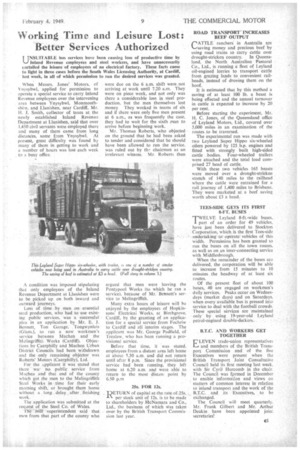Working Time and Leisure Lost: Better Services Authorized
Page 9

If you've noticed an error in this article please click here to report it so we can fix it.
INSUITABLE bus services have been causing loss of productive time by Inland Revenue employees and steel workers, and have unnecessarily curtailed the leisure of employees of an electrical factory. These facts came to light in three caws before the South Wales Licensing Authority, at Cardiff, • last week, in all of which permission to run the desired services was granted.
When Messrs. Jones' Motors, of Ynysybwl, applied for permission to operate a special service to carry Inland Revenue employees over the intervening area between Ynysybwl, Monmouthshire, and Llanishen, near Cardiff, Mr. H. J. Smith, collector of taxes at the newly established Inland Revenue Department at Llanishen, said that over 1,450 civil servants were employed there and many of them came from long distanes, some from Ynysybwl. At present, great difficulty was found by many of them in getting to work and a number of hours was lost each week to a busy office.
A condition was imposed stipulating that only employees of the Inland Revenue Department at Llanishen were to be picked up on both inward and outward journeys.
Loss of time by men on essential steel production, who had to use existing public services, was a successful plea in an application by Mr. E. J. Bennett, Ton Garage, Tongwynlais (Glam.), to run a new workmen's service between Machen and the Melingriffith Works (Cardiff). Objections by Caerphilly and Machen Urban District Councils had been withdrawn and the only remaining objector was Roberts' Motors (Caerphilly), Ltd, For the applicant it was stated that there ww no public service from Machen and that end of the county which got the men to the Melingriffith Steel Works in time for their early morning shift, or brought them home
• without a long delay, after finishing work.
The application was submitted at the request of the. Steel Co. of Wales, The mill superintendent said that men from that part of the county who were due on the 6 a.m. shift were. not arriving at work until 7.20 a.m. They were on piece work, and not only was there a considerable loss in steel production, but the men themselves lost money. They worked in teams of six and if there were only five men present at 6 a.m., as was frequently the case, they had to wait for the sixth man to arrive before beginning work.
Mr. Thomas Roberts. who objected on the ground that he had been asked to tender and considered that he should have been allowed to run the service, was ruled out by the chairman as an irrelevant witness. Mr. Roberts then argued that men were leaving the Pontypool Works (to which he ran a service), because of Mr. Bennett's service to Melingriffith.
Many extra hours of leisure will be enjoyed by the employees of Hopkinsons' Electrical Works, at Birch grove, Cardiff, by the granting of an application for a special service from Fochriw to Cardiff and all interim stages. The applicant was Mr. George Padfield, of Trealaw, who has been running a provisional service.
Before that time, it was stated, employees from a distant area left home at about 5.30 a.m. and did not return until after 8 p.m. Since the provisional service had been running, they left home at 6.20 a.m, and were able to return to the most distant point by 6.50 p.m


























